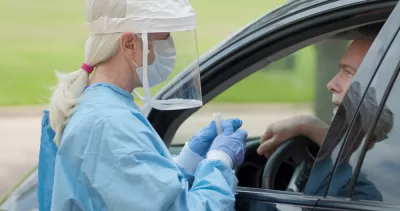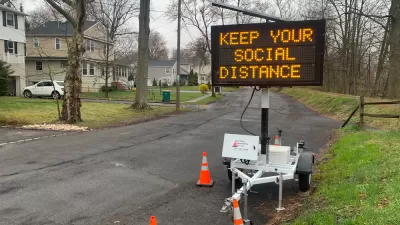Dr. Anthony Fauci, who is helping to lead the Trump administration's response to the pandemic, shared positive news with CNN on the progress of the vaccine project but admitted that due to two factors, it is likely not to achieve herd immunity.

"I am cautiously optimistic that we will have one or maybe more candidates of vaccines that could be available and be effective by the end of the year; the beginning of 2021," Anthony S. Fauci, director of the National Institute of Allergy and Infectious Diseases, told Elizabeth Cohen, senior medical correspondent for CNN, in an interview on Sunday.
How effective it would be is another matter.
"The best we've ever done is measles, which is 97 to 98 percent effective," said Fauci. "That would be wonderful if we get there. I don't think we will. I would settle for [a] 70, 75% effective vaccine."
Another infectious disease expert, Dr. Drew Weissman of the University of Pennsylvania, told the AP on Saturday that If it was only 50% effective, "that’s still to me a great vaccine."
The other issue that limits its effectiveness in protecting the population as a whole, what the Centers for Disease Control and Prevention refers to as community immunity, commonly called herd immunity, is the percentage of people who would willingly take the vaccine if available. To protect individuals unable to receive a vaccine, somewhere between 70-90 percent of the population would need to be immunized.
"A CNN poll last month found one-third of Americans said they would not try to get vaccinated against Covid, even if the vaccine is widely available and low cost," adds Cohen. If only two-thirds of the population were to take the vaccine that is at most 75% effective, it would then be "unlikely" that the U.S. will achieve sufficient levels of immunity to quell the outbreak, admitted Fauci.
He indicated that a major challenge is that "there is a general anti-science, anti-authority, anti-vaccine feeling among some people in this country -- an alarmingly large percentage of people, relatively speaking."
Rushed process?
However, the name of the vaccine endeavor, Operation Warp Speed, does not exactly inspire confidence that it would safe. The last time that the government attempted to deliver a vaccine well ahead of standard vaccine timelines was 1976 for a swine flu outbreak. "It was a total fiasco," reported for The Washington Post on May 1.
There were reports of sporadic deaths possibly connected to the vaccine. Cases of Guillain-Barre syndrome also emerged, and are still cited today by the anti-vaccine movement. Panic emerged, with dozens of states pausing vaccinations.
By December, following 94 reports of paralysis, the entire program was shut down.
So, what is a "normal timeline?" Ten years, according to one prominent World Health Organization official. "In the history of medicine, rarely has a vaccine been developed in less than five years," according to Kaiser Health News.
"The mumps vaccine—considered the fastest ever approved—took four years to go from collecting viral samples to licensing a drug in 1967," wrote Nsikan Akpan, a science editor at National Geographic, on April 10. "Considering the history and science behind making these drugs, 'a year to 18 months would be absolutely unprecedented,' one expert warns."
Related in Planetizen:
-
Pandemic Endgame, May 18, 2020
-
The Great Scandinavian Pandemic Experiment [includes a discussion of herd immunity through infection], May 13, 2020
FULL STORY: Fauci says Covid-19 vaccine may not get US to herd immunity if too many people refuse to get it

Alabama: Trump Terminates Settlements for Black Communities Harmed By Raw Sewage
Trump deemed the landmark civil rights agreement “illegal DEI and environmental justice policy.”

Study: Maui’s Plan to Convert Vacation Rentals to Long-Term Housing Could Cause Nearly $1 Billion Economic Loss
The plan would reduce visitor accommodation by 25% resulting in 1,900 jobs lost.

Planetizen Federal Action Tracker
A weekly monitor of how Trump’s orders and actions are impacting planners and planning in America.

Wind Energy on the Rise Despite Federal Policy Reversal
The Trump administration is revoking federal support for renewable energy, but demand for new projects continues unabated.

Passengers Flock to Caltrain After Electrification
The new electric trains are running faster and more reliably, leading to strong ridership growth on the Bay Area rail system.

Texas Churches Rally Behind ‘Yes in God’s Back Yard’ Legislation
Religious leaders want the state to reduce zoning regulations to streamline leasing church-owned land to housing developers.
Urban Design for Planners 1: Software Tools
This six-course series explores essential urban design concepts using open source software and equips planners with the tools they need to participate fully in the urban design process.
Planning for Universal Design
Learn the tools for implementing Universal Design in planning regulations.
Caltrans
Smith Gee Studio
Institute for Housing and Urban Development Studies (IHS)
City of Grandview
Harvard GSD Executive Education
Toledo-Lucas County Plan Commissions
Salt Lake City
NYU Wagner Graduate School of Public Service





























